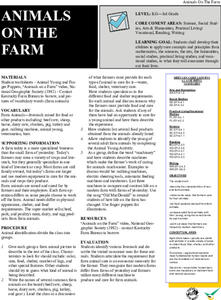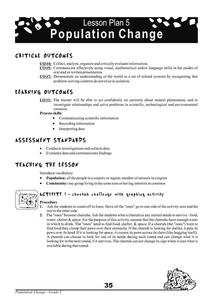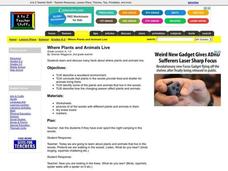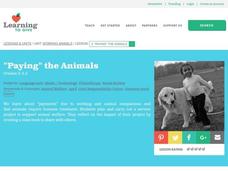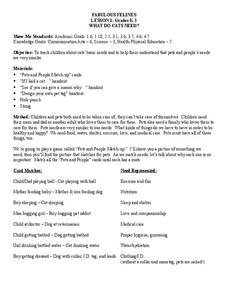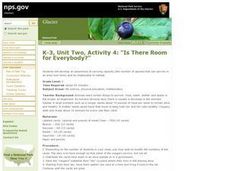Baylor College
A Place to Be
Home sweet home. Humans, birds, beavers, ants, we all need a place place to rest and keep us safe. In the ninth lesson of this series, the importance of shelter is discussed as the teacher reads aloud the book Tillena Lou's Day in the...
Curated OER
Farm Animals
Why are farm animals important to the community? Expand young farmers' knowledge of furry and feathered friends through stories and a video. There are several books recommended; however, you could use any book about farm animals. A video...
Baylor College
Need or Want?
Even as adults it can be hard to distinguish needs from wants. Using pictures of common, everyday items, children make a pocket chart separating the objects they need from those that they want. Discuss their choices, explaining that...
Curated OER
Carrying Capacity
Young biologists identify how plants and animals are affected by changes in their ecosystem and environment. The concepts of succession, maintenance of habitats, interrelationships, and adaptation are all discussed. This well-developed...
Curated OER
Plants and Animals
Students find common needs between plants and animals. In this plants and animals lesson students compare that both plants and animals need food and water. They also find the differences between plant and animal needs.
Curated OER
Animals on the Farm
Students work in groups to create a description of a farm animal. Other classmates try to guess the animal. The class discusses what farmers need to provide for each animal on their farm (food, shelter, veterinary care). Students...
Curated OER
Singing for the Animals
Young scholars examine the correct attitudes and poster for a concert. In this "Singing for Animals" lesson, students created charts to diagram information about the homeless animals they were singing for. Young scholars used correct...
Cheetah Outreach
Population Change
Your youngsters become cheetahs in search of food, water, shelter, and space in a fun physical game that does a fantastic job of representing fluctuating species population based on resources available over years.
Curated OER
Where Plants and Animals Live
Students explore and discuss facts about a woodland environment, the plants and animals that live there, and changing seasons in the woods. They conclude that plants in the woods provide food and shelter for animals living there.
Curated OER
Sunken Millions Animals
This PowerPoint includes a game with ocean graphics in which two teams answer increasingly difficult questions about animals. Topics covered include plant and animal cells, animal adaptation, and similarities and differences between...
Curated OER
Water, Water Everywhere (Pond Animals)
Second graders examine the characteristics of animals who live in a pond environment. In groups, they describe the various stages in the life of a frog and identify the characteristics of other pond animals. Using this information,...
Curated OER
Working Animals
Pupils examine the need for the humane treatment of animals. In this animal welfare lesson, students realize the need for animal welfare, and decide on a service project that will promote it. The lesson culminates in the creation of a...
Curated OER
Animal Habitats
Learners research an animal and their habitat. In this animal habitat instructional activity, students observe a WebQuest that describes the different habitats: deserts, tundra, rainforest, forest, and ocean. They determine which habitat...
Curated OER
Animal Names
Students match animal pictures with animal words. In this farm animal activity, students put together the parent and their offspring. Students should have prior knowledge of the basic needs of animals. Students write animal booklets.
Curated OER
What's Wild
Third graders discover the differences between wild and domestic animals. In this animal lesson, 3rd graders chart the differences in the animals and look through magazines for pictures of wild and domestic animals to glue to a poster....
Curated OER
I See a Coyote
Students role-play coyotes looking for natural resources. In this natural resources instructional activity, students examine the relationship between animal life and the environment. Students play a game that demonstrates how natural...
Teach Engineering
Live Like an Animal
When your parents say that your room's a pig sty, tell them about biomimicry. The sixth installment of a nine-part Life Science unit has scholars research the shelters used by animals in the natural world, like turtle shells. Using the...
Curated OER
Animal Habitats
Elementary schoolers complete a worksheet that has them decide which of four environments a variety of animals live in. The environments are: pond, soil, ocean, and woodland. There are 12 different types of animals that pupils must match...
Science Matters
Oh Heron
Two teams—the environmentalists and herons—play four rounds of the game, Oh Heron. Using hand symbols to represent food, shelter, and water, players locate their match to produce more herons while those unmatched decompose.
Curated OER
Fabulous Felines
Students explore basic needs through discovering that pets and people need very similar things. They will play matching games, sing songs, read books, and discuss the needs of people and animals.
National Wildlife Federation
Massive Migrations
Turn your students into flocks of migratory birds for this fun lesson on animal migration. Prior to the activity, the teacher creates four different migration routes in the classroom or any available open space, labeling nesting...
Michigan State University
Create an Animal
Think beyond the animals and habitats we've already discovered and allow scholars to dream up their very own habitat and an animal that lives there. Class members present the new habitat and animal on a poster alongside an...
Curated OER
Is There Room for Everybody?
Third graders examine the capacity of animals able to live in one habitat. For this habitat lesson, 3rd graders play a game that shows the food chain and the interactions between animals in an area. Students discover that food is a major...
Curated OER
Hidden Animals
Students predict the safest seashore substrate for animals. In this animal habitat experiment, students predict, test their hypothesis, and record data about how wave shocks affect animals living on either sand, gravel or rock.







